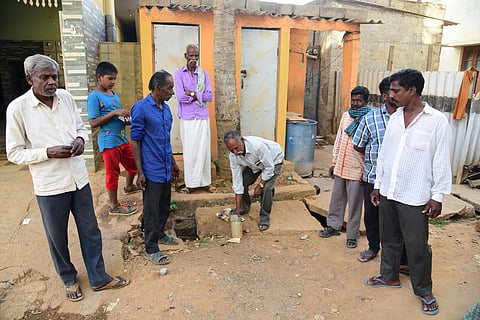

BENGALURU: In the backyard of Manyata Tech Park, one of Bengaluru’s topnotch IT Parks, amid luxury high-rises and infrastructure of Thanisandra Road that reflect the glitz of Bengaluru’s 24/7 economy, is a small settlement of families, near a government primary school. They are IT City's manual scavengers, who earn their living cleaning the city’s cesspools filled with sewage and faecal sludge.
Narayanswamy (58) is the most experienced of the workers living in the area, and has spent more than half his life inside septic tanks, which he cleans with bare hands and loads on to tempos for petty money. "My two sons died cleaning septic tanks. I am used to the filth and sewage and this my life now," said Narayanswamy, demonstrating how they clean single-pit latrines.
There is Muniyappa, who goes down the septic tank with a gangrene infested leg, whenever the pain is not that bad, and the doctor’s threat is downed at the nearby watering hole with a prized pint. Back home are his two children, who need the money. Gangrene is a lesser threat than hunger.
"The reality of manual scavengers is bleaker than their health and the conditions they live in," said Shakuntalamma, member of Safai Karmachari Kavalu Samithi (SKVS) -- a watchdog committee on sanitation workers in Karnataka.
She is right. Inside a rundown mud hut opposite the government school, lives another manual scavenger Ramdas, his wife Sujathamma and their teenaged son. "I first cleaned a septic tank 18 years ago, when I came to the city from my village in Chikkaballapur, looking for work. I had no experience cleaning a septic tank. The stench and gases had made me sick for many days. I am used to this now," said Ramdas (50).
Sujathamma cooks their meal on a clay oven and spends a fortune on wood (saudey). The couple is aware of government schemes on cooking gas but seems to be too bogged down by their poverty and ramshackle lifestyle to complain.
Ramdas and Sujathamma have their assets: a pile of government documents -- Aadhaar card, ration card, voter ID card and a recent certificate from the Bangalore Water Supply and Sewerage Board (BWSB) for Ramdas, on training of ‘sanitation’ workers, which they have kept neatly in a jute bag. "We’ve got all our documents, even this flier on health insurance," the couple chimed.
The soot on the wall and Ramdas’s routine visits inside septic tanks give away the prognosis of their incessant cough. But they don’t cough alone. Outside their hut are Ramdas’s colleagues -- Thirumala Venkatesha, Balakrishna, Narayanswamy and others, who cough as much.
It doesn’t sound right. Nothing does. A dusty bulb hangs lifelessly from the thatched roof of Ramdas’s hut. "We don’t have electricity or water connection," said Sujathamma, with a grin. The couple pays Rs 2,000 for the hut, which is half eaten by termites and threatens to collapse any time.
Manual scavenging is prohibited, but the reality of our poor underground drainage system defeats the purpose of the law. "No government agency cleans private septic tanks. In Bengaluru, only 79.3 per cent households are connected to the underground drainage (UGD). The rest are single-pit or septic tank latrines, which are manually cleaned. This translates to over 4 lakh toilets," said Siddhartha of SKKS.
BWSSB recently trained some sanitation workers (safai karmacharis) in batches, but has left it to them to buy their safety kits, said Narayanswamy. "I spent Rs 2,000 to buy gloves, cap, mask and boots," he laughed, spat and held the sewage pipe with a certain amount of camaraderie and piety.